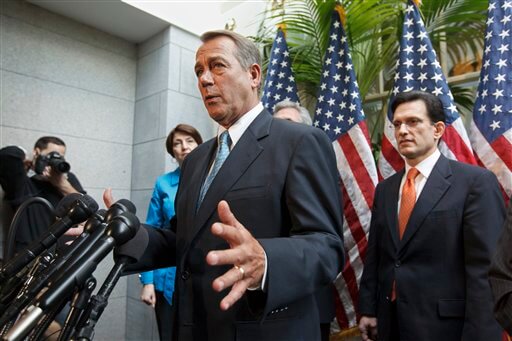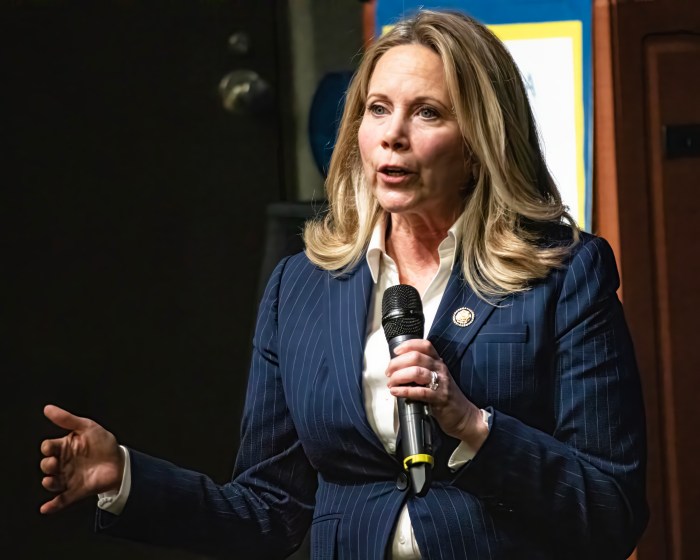
A united House Republican leadership surrendered crisply and cleanly on legislation to extend expiring payroll tax cuts for 160 million Americans, skipping most if not all of the self-defeating drama that accompanied their far noisier retreat on the same issue late last year.
In doing so, they helped avert an election-year tax increase on the middle class as well as the blame Democrats surely would have sought to pin on them for hampering an economic recovery.
Yet they also handed President Barack Obama an unambiguous political victory as he campaigns for re-election.
And perhaps most strikingly, because the tax cuts are not offset by spending reductions, the tea party-backed majority quietly acquiesced to a $101.1 billion increase in the deficit for the current fiscal year, wiping out billions in short-term reductions in red ink that it won in a series of pitched political battles in 2011.
“The mood is to get it off the table,” freshman Rep. Dennis Ross, a Florida Republican, said this week of the measure that is expected to clear Congress in the next day or so. “We’ve got to move on to another issue.”
Across the Capitol, Sen. Lindsay Graham, R-S.C., said the legislation to keep the payroll tax cuts in place was an exception rather than a new rule. “Not going to do this again, but if it gets us through the year, gets this issue off the table, it’s worth doing this way,” he said.
In fact, some conservatives argue that tax cuts lead to greater economic growth and therefore do not increase deficits. Others argue that, at a minimum, they require additional borrowing by the government and weaken Social Security as a result.
No matter the view, the relative lack of controversy showed a House GOP chastened by the outcome of a different sort of showdown last December.
Then, the bill is question was a mere two-month extension of tax cuts, fully offset by spending cuts. Digging in their heels, they demanded an alternative that lasted to the end of the year, and wound up being pilloried by Obama, congressional Democrats and even some Senate Republicans for risking a tax hike on Jan. 1.
“In the end House Republicans felt like they were re-enacting the Alamo, with no reinforcements and our friends shooting at us,” veteran Republican Rep. Kevin Brady of Texas said then.
No one is likely to say that now, although Newt Gingrich, the former House speaker now seeking tea party support for his presidential run, declined to say if he favors or opposes the bill.
“I would have found an offset,” he said in a comment relayed through his spokesman, R.C. Hammond, indicating he was less than completely supportive.
Former Massachusetts Gov. Mitt Romney’s campaign did not respond to requests for comment over two days, and there was no immediate response from a spokesman for former Sen. Rick Santorum.
The bill in question fulfills key ingredients of Obama’s jobs package, initially laid out last September. The 2-percentage point payroll tax cut that had been set to expire on Feb. 29 will now run until the end of the year. That’s worth an extra $20 a week in the average American paycheck.
Unemployment benefits that were due to phase out beginning at the end of the month are similarly extended through the end of the year, although Republicans won some concessions.
The fees paid to doctors who treat Medicare patients will remain stable for the duration of 2012 as a result of the legislation, rather than plunge by 27 percent as they would have without an agreement.
It had been clear for months that all three provisions would be extended, but the two parties have been at odds for months over steps to offset the costs.
In the public relations war that played out late last year, Republicans said Democrats wanted to raise taxes to cover the cost, while Democrats said Republicans wanted to cut Medicare.
Democrats countered that they only wanted the wealthy to pay their fair share of taxes, and Republicans said they had no intention of cutting benefits for millions of seniors.
It was a politically charged deadlock that defied solution in December, and again when the two sides picked up the negotiations after the first of the year.
In the end, Republicans decided it wasn’t worth the struggle.
Speaker John Boehner, Majority Leader Eric Cantor and House GOP Whip Kevin McCarthy announced they would introduce legislation to extend the tax cuts — minus any provisions to protect the deficit — and coupled their retreat with an accusation that Democratic “obstructionism and stonewalling” had made them do it.
As politically significant as the message was the roster of messengers.
The standoff last December exposed rifts within the leadership — particularly between Boehner and Cantor and their aides — that prompted protests from members of the rank and file, according to numerous officials.
That led to quiet efforts to repair relationships.
And a more public campaign to put responsibility for the weak economy back onto Obama.
“Last fall, I said that the only reason we are even talking about a payroll tax break or an extension of unemployment benefits is because the president’s economic policies have failed,” Boehner said at a news conference as the final details were ironed out.
“I still believe that to be the case today.”
___
EDITOR’S NOTE — David Espo is AP’s chief congressional correspondent.
Copyright 2012 The Associated Press.


































